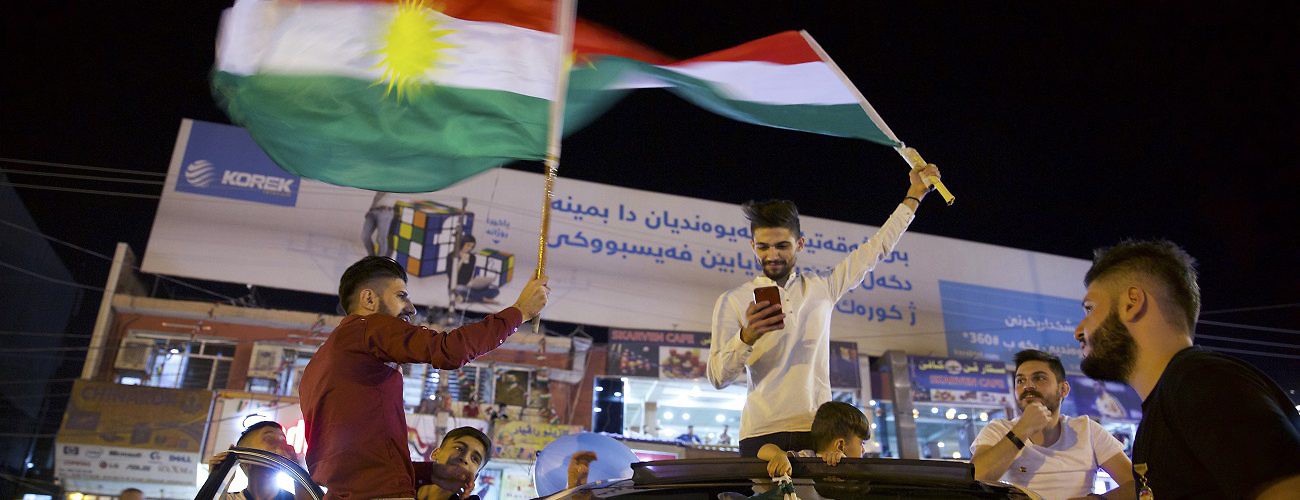Kurds celebrate on the night of independence referendum. Duhok, Iraqi Kurdistan, September 25, 2017 (Noe Falk Nielsen/NurPhoto/Associaed Press)
Despite facing severe opposition from the central Iraqi government, Iran, Turkey, and other powers, the Kurdistan Regional Government (KRG) moved ahead with a historic referendum regarding independence from Iraq on Monday this week. After an estimated 78% of the five million eligible Kurdish voters turned up at polling booths, the Kurdish government announced a 93% “yes” vote for independence.
The question is, what happens next? Iraqi Prime Minister Haider al-Abadi has refused to speak with the KRG about what he calls an “unconstitutional” referendum, and the United Nations anticipates the vote will be a potentially destabilizing force in an already complex Middle East. Despite the result being non-binding and not designed to usher in sovereignty or demarcate boundaries in and of itself, most of the Kurds I spoke to following the vote reported a general environment of enthusiasm and excitement.
For now, the referendum remains a determined attempt to show the international community that the Kurds remain masters of their own destiny. Many people actively participating will have been too young to even remember former Iraqi President Saddam Hussain evicting and launching chemical attacks on the Kurdish minority in 1988, killing close to 50,000 men, women, and children. But most families have experience with persecution from the Arab majority population, which makes the case for independence central to their identity; youth in Kurdistan don’t speak Arabic, nor do they associate with the Arab identity.
Young people, however, do have vivid memories of the Kurdish Peshmerga and United States-led coalition forces defending the region from the so-called Islamic State (ISIS) up until two years ago. By many accounts, the Kurds have been indispensable in the global fight against ISIS. Having made major sacrifices and with international attention on the region now waning, KRG Prime Minister Masoud Barzani has convinced the Kurds that the time is ripe to rally for a nation state.
Despite the importance of the Kurds to its Middle East foreign policy objectives, the US State Department has reportedly been “deeply disappointed” by the referendum. Given a lack of support from this potentially critical partner, it remains unlikely that the Kurds will see a nation of their own very soon. This is especially so if neighbors such as Iran and Turkey begin to exert diplomatic and economic pressure. Both are concerned about the domino effect of secessionist spirit in their own sizeable Kurdish minorities.
What is most notable is that neither Barzani nor his party have a multi-faceted plan to address the myriad problems the Kurdish region will likely now face. Believing that the vote risked “ethnic and sectarian war,” Turkish President Recep Tayyip Erdogan has ordered his forces to begin joint military drills on the Iraqi border. The KRG is not currently a self-sufficient entity and critical to its existence are diplomatic and economic relations, both of which are threatened by the referendum.
The international legitimacy of the vote remains in question. The UN noted that it was “unilaterally declared, included disputed areas,” and was opposed by the global community, including Iraqi authorities. There have also been questions around the legality of Barzani calling the referendum, given that his term ended in August 2015, but he refused to step down and remains unofficially in office.
Uncertainty over the vote also comes as the Kurdish region faces a range of political and economic problems, including massive unemployment of about 13% and rising. A series of setbacks began in 2014, starting with Baghdad cutting the KRG’s share of federal funding. The emergence of ISIS and its foray into Iraqi territory in June 2014 further complicated matters, with the Peshmerga barely recognized as an official security force and the KRG being forced to divert funds from other purposes toward security. An influx of close to two million refugees and internally displaced persons created further burden, and the Kurdish government subsequently failed to respond to the falling oil prices starting in mid-2014.
Despite their strong support for the referendum, the country’s large youth cohort remains frustrated and disenchanted with the government’s actions and the country faces rampant corruption and deepening rifts among numerous political parties. Many believe that Barzani and his Kurdish Democratic Party (KDP) have steered away from a democratic system, choosing instead to bolster tribal leadership. Weak rule of law, unequal distribution of wealth, and human rights violations including attacks on media have become common from the government.
Barzani has worked to establish himself as the figurehead who will lead the Kurdish people toward independence. The danger is that unfulfilled expectations may reduce his political mileage in the near future.
Beyond some advancement in the independence project, those, mainly young people, which have supported the president will continue to expect more immediate improvements in their standard of living, including jobs, greater provision of basic services such as electricity and water, and an overarching and concrete economic plan.
Progress toward these goals could be jeopardized under the severe sanctions now likely to be imposed on the KRG from several sources. The Iraqi government has already imposed an embargo on international air travel to and from Irbil. Turkey could also cause serious economic pain by closing an oil export pipeline from Kurdistan.
The outcome of the referendum has so far vindicated those who saw it as an emotional decision exploited by politicians and devoid of any chance of rational outcome. The KRG seems in a poor economic, military, and political position to execute the results of the voting. Without any further progress, Barzani may thus become known for cheating his people out of what they see as a deeply historic and sacred right.
Arsla Jawaid is a Concord Fellow and consults for policy institutes on issues of violent extremism and youth radicalization.





